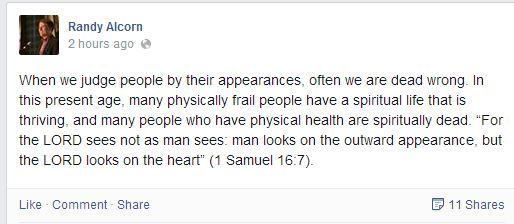Randy Alcorn's Blog, page 175
September 22, 2014
The Problem of Plagiarizing by Pastors and Christian Leaders
A reader of my blog asked if I’d be willing to share some thoughts on the practice of pastors who preach messages from other pastors and present the material as their own without any credit to its original source. This isn’t an issue that I take pleasure in addressing, but I hope it will serve the body of Christ by initiating some much-needed self-examination and dialogue.
While most pastors I know are men of honesty and integrity, it’s a sad truth that the problem of pastors plagiarizing is more wide spread than many realize, especially with the vast amounts of material available on the internet. My friend Barry Arnold, who pastors Cornerstone Church in Gresham, Oregon, writes:
I’m afraid plagiarism is getting more and more common. Once in a while I Google unusual phrases from sermons I have posted online. It is not at all uncommon to find other pastors stealing material. I’m disappointed for their sake because if they are compromising their integrity in teaching, you have to wonder what other areas may be secretly out of control as well.
One pastor took a whole series of messages from me and used them verbatim, changing only the illustrations. At least he was smart enough to know it might be awkward to talk about growing up in an Alaskan village. I emailed the pastor a couple times but he didn’t respond. I then contacted each of his elders separately but none of them ever responded either.
 As an author, I often see material online straight from my books with no attribution, so it appears the pastor or blog writer originated the material. I don’t lose any sleep over this—in fact, at times, including when one of my books had clearly influenced the godly author’s writing of several chapters, I’ve honestly celebrated the fact that the material is making an impact. There was something about not being credited, especially believing it wasn’t a conscious choice, that makes me feel like I’m making a difference behind the scenes. Yes, when it’s word for word from one of my books, it bugs me a little, but I hope it’s not bugging me for the wrong reasons, but the right ones.
As an author, I often see material online straight from my books with no attribution, so it appears the pastor or blog writer originated the material. I don’t lose any sleep over this—in fact, at times, including when one of my books had clearly influenced the godly author’s writing of several chapters, I’ve honestly celebrated the fact that the material is making an impact. There was something about not being credited, especially believing it wasn’t a conscious choice, that makes me feel like I’m making a difference behind the scenes. Yes, when it’s word for word from one of my books, it bugs me a little, but I hope it’s not bugging me for the wrong reasons, but the right ones.
Our ministry hasn’t felt the need to address every case that comes to our attention. On the other hand, in some cases there is pride or laziness and deceit in taking credit (by implication, when failing to attribute the source) for someone else’s work, and we are compelled to speak the truth in love (Ephesians 4:15). What concerns me even more is, often once the person is found out, they or those who are part of their accountability structure do not respond in repentance but ignore the situation, such as in Barry’s case mentioned above. Our office experienced the same thing several months ago. The pastor seemed surprised when it was pointed out that he had used material from one of my books almost verbatim. He questioned this and asked for specific examples. When they were provided, he never responded again.
Several years ago we found out that a prominent radio pastor’s message was, word for word, four pages out of my book The Treasure Principle. (Someone emailed to ask EPM if I had ripped off this man’s material and used it in my book!) In this case, the particular pastor did contact me and was repentant which was encouraging. (It’s also possible that in some cases the pastor or speaker isn’t aware the material was taken verbatim elsewhere because they have a research assistant who wasn’t very careful.)
I recently discovered that either I or an editor had inadvertently placed an endnote to a quotation from Wayne Grudem too early in one of my books, so it appeared that the following few sentences were mine, when they were actually Grudem’s. Naturally, we contacted the publisher and asked them to change it for the next printing. Mistakes like this can happen, nobody’s perfect, and since it happened to me (and for all I know may have happened in another book), all we can do is try our best not to let it happen, and correct such errors when we become aware of them.
I was a pastor for 14 years. I know that a pastor’s life is very busy and that the temptation to take shortcuts in preparing sermons is very real. That doesn’t change the fact that God is never in the dark. He is always watching. “Whoever walks in integrity walks securely, but he who makes his ways crooked will be found out” (Proverbs 10:9).We may fool ourselves and others, but never God. He knows what we’re thinking about and what we’re doing. And it is His appraisal of our life that ultimately matters.
Paul wrote this advice to the young pastor Titus: “Show yourself in all respects to be a model of good works, and in your teaching show integrity, dignity, and sound speech that cannot be condemned, so that an opponent may be put to shame, having nothing evil to say about us” (Titus 2:7-8).
It may be helpful to realize that many pastors and authors I know, including me, welcome their material that’s online being shared and utilized, as long as proper credit is given. If in doubt, ask! (Our ministry, like many others, encourages visitors to freely share material they find on our site, not only verbally but in printed form as long as no wording is changed, no fees are charged, and credit is given. We never charge a dime for this.)
Sometimes a pastor, in preparing a particular sermon, may have been heavily influenced by another, let’s say John Piper. One way to handle this would be to say, “There’s an online sermon by John Piper that profoundly influenced my preparation this week. Rather than stopping every few minutes to acknowledge my debt to Piper where he influenced my thinking and my words, I want to say this upfront, and encourage you to go to his sermon called * at Desiring God’s website and read it yourself. I’ve added some of my own thoughts and illustrations, but as you’ll see I couldn’t improve on parts of it and I want to be sure you know that much of what I’m saying is from Piper.”
This is being honest and forthright and humble. I wouldn’t recommend drawing heavily from a single source every week, of course, because it’s reasonable for people to assume the pastor is doing his own research. But by all means if you’re heavily dependent on a source, say so. If you are using a direct quotation from someone, say so.
Some sayings are commonly present and their source is unknown. For instance, “Resentment /Bitterness is like taking poison and waiting for someone else to die.” Such statements can be made without attribution, but it’s a good practice to make clear it’s not original with you, for instance, “You may have heard the statement, ‘Bitterness is….’”
One caution. Some speakers over-attribute, e.g. “* * says ‘Christians aren’t perfect, just forgiven.’” This is so widely stated that it’s almost certain it didn’t originate with the person you heard say it. Or “JOY means, ‘Jesus, Others, You.’” Don’t attribute this to your pastor, but don’t make it sound like you made it up either, “e.g. the way I phrase it is, ‘Jesus, Others, You…’” Better to put it, “It’s sometimes said…” Just don’t appear to be taking credit for what didn’t originate with you. Whatever parts of your message or book that you don’t attribute to others will be assumed to be, in their phrasing, composed by you.
Obviously, if you’re saying, “Materialism is harmful,” a thousand other people have said the same thing, and no attribution is necessary. Anyone can say “How we think about God is critically important,” but if you say: “What comes into our minds when we think about God is the most important thing about us,” you’d better attribute it to A. W. Tozer. Now, though I just “made up” the unremarkable statement “How we think about God is critically important,” I expected to see dozens if not hundreds of hits for it online. Turns out there was only one, from someone’s blog six years ago. But since I didn’t get that sentence from that person or anyone else, no need to cite the source…precisely because they were not my source.

Countless things said in any sermon will have been said by someone else—but when the identical wording is exact and extended, then it is obviously taken from a particular source. And making minor changes in words here and there doesn’t make it okay either, as every professor who confronts a student with plagiarism has explained.
Most, if not all, colleges and universities have serious policies that threaten expulsion if a student is found to be plagiarizing. If the world recognizes the ethical problems with plagiarism, how much more should Christ’s church!
I think most of us know intuitively when we’re not doing it right or wrong, but we may need reminders. No matter how we rationalize it, all deception within the evangelical community dishonors Christ, and serves the devil’s agenda. We need to identify deception, repent of it, and embrace the truth of Christ which will set us free to represent Him accurately (John 8:32).
Only when Christian leaders establish new and higher standards will others feel the positive peer pressure and accountability to do the same. Only then will reform be widespread, with honesty and integrity becoming the established norm.

Each blog regularly appears on my Facebook page. If you’d like to comment or see others’ comments, we invite you to join us there.
photo credit: dissolved via photopin cc | Chris Yarzab via photopin cc
September 19, 2014
Will our new resurrection bodies have new abilities?
The disciples were meeting behind locked doors because they were afraid of the Jewish leaders. Suddenly, Jesus was standing there among them! —John 20:19
Suddenly, their eyes were opened, and they recognized him. And at that moment he disappeared! —Luke 24:31
He was taken up into a cloud while they were watching, and they could no longer see him. —Acts 1:9
He will take our weak mortal bodies and change them into glorious bodies like his own, using the same power with which he will bring everything under his control. —Philippians 3:21
 Christ’s resurrection body had an ability to appear suddenly, apparently coming through a locked door to the apostles. And “He disappeared” from the sight of the two disciples at Emmaus. When Christ left the earth, He defied gravity and ascended into the air. It’s possible that the risen Christ, who is man yet God, has certain physical abilities we won’t have. Appearing and disappearing could be a limited expression of His omnipresence, and His ascension might be something our bodies couldn’t imitate.
Christ’s resurrection body had an ability to appear suddenly, apparently coming through a locked door to the apostles. And “He disappeared” from the sight of the two disciples at Emmaus. When Christ left the earth, He defied gravity and ascended into the air. It’s possible that the risen Christ, who is man yet God, has certain physical abilities we won’t have. Appearing and disappearing could be a limited expression of His omnipresence, and His ascension might be something our bodies couldn’t imitate.
On the one hand, because we’re told in multiple passages that our resurrection bodies will be like Christ’s, it may be possible at times for us to transcend the present laws of physics and/or travel in some way we’re not now capable of. On the other hand, it’s our God-given human nature to be embodied creatures existing in space and time. So it’s likely that the same laws of physics that governed Adam and Eve will govern us. We can’t be sure, but either way it will be wonderful.
Our dying bodies must be transformed into bodies that will never die; our mortal bodies must be transformed into immortal bodies. —1 Corinthians 15:53
Our resurrection bodies will never fail us. They’ll work in perfect concert with our resurrected minds. We won’t get sick, grow old, or die from either an accident or natural causes.

Each blog regularly appears on my Facebook page where people often comment on it. If you’d like to comment or see others’ comments, we invite you to join us there.

Now available from EPM
Everything You Always Wanted to Know About Heaven is a beautiful leather-like gift book that provides solid, biblically based answers to more than 100 questions about God, Heaven, angels, and eternity. (This is a special edition of Randy's book TouchPoints: Heaven.)
EPM price $9.99 (retail $14.99)
September 17, 2014
Perspectives on College: Blogs from Desiring God
 For those just starting college, or returning, this series of video blogs from Desiring God is outstanding. I highly recommend you read and watch them, and that parents and others do the same. Many spiritual lives have flourished on college campuses; many have been shipwrecked and ruined. The perspective you bring and maintain in college will have consequences, for better or worse, the rest of your life.
For those just starting college, or returning, this series of video blogs from Desiring God is outstanding. I highly recommend you read and watch them, and that parents and others do the same. Many spiritual lives have flourished on college campuses; many have been shipwrecked and ruined. The perspective you bring and maintain in college will have consequences, for better or worse, the rest of your life.
Here are links to the first three blog posts:
You’re Not a Student First
Education Is a Privilege, Not a Burden
Aim Higher than 4.0
(The remaining two will be available on the Desiring God blog in the coming weeks.)

Each blog regularly appears on my Facebook page. If you’d like to comment or see others’ comments, we invite you to join us there.
September 15, 2014
The InterVarsity Situation and Why Inclusivity is Not the Greatest Good
As Americans we’ve been slow to come to grips with how much our country has changed, and with it, the degree to which being Bible-believing Christ-followers is increasingly socially unacceptable. I don’t mean we shouldn’t work to hold onto our religious liberties—of course we should. But likely they will continue to erode. Cheer up though, opposition is nothing new for God’s people and the church’s greatest accomplishments have happened not in the thick of popularity, but unpopularity.
Jesus said, "If the world hates you, keep in mind that it hated me first” (John 15:18). Peter said, “Dear friends, do not be surprised at the fiery ordeal that has come on you to test you, as though something strange were happening to you” (1 Peter 4:12)
I asked EPM’s sharp and ever-insightful Julia Stager to share her thoughts on a current issue of significance. Here’s what she had to say, which I greatly appreciate. —Randy
This school year the California State University system is enacting a non-discrimination policy for all student organizations. This non-discrimination policy prohibits faith-based student organizations from requiring students to be of that faith to hold a leadership position.
 InterVarsity Christian Fellowship has refused to comply with this standard and therefore is no longer recognized as an official student organization. Loss of this status means InterVarsity will no longer have the same access to student fairs and campus facilities, which in turn greatly increases their costs for meeting on campus and makes it harder to meet and invite new students.
InterVarsity Christian Fellowship has refused to comply with this standard and therefore is no longer recognized as an official student organization. Loss of this status means InterVarsity will no longer have the same access to student fairs and campus facilities, which in turn greatly increases their costs for meeting on campus and makes it harder to meet and invite new students.
Many Christian news sources and blogs have rightly drawn attention to this situation, but some have done so as if this were a surprising thing for these California universities to do. In our increasingly post-Christian society, how can we expect the government or other secular organizations to value and accommodate Christianity?
In America today, inclusivity is a greatest good. Morals are not the greatest good. Helping people is not the greatest good. Sacrifice is not the greatest good. Acceptance is the greatest good. Therefore, requiring groups to be inclusive is a fundamentally rational decision for CSU’s administration.
From a Christian perspective we see the issue of acceptance very differently. We’ve been accepted regardless of who we were and what we’ve done, how we’ve been labeled and how we labeled ourselves. Christianity accepts people regardless of race, national origin, ethnicity, color, age, gender, marital status, citizenship, sexual orientation, or disability.
But Christians also know there’s more than acceptance, there’s transformation. And that’s what we want to share with people. We want to communicate the hope we have through Jesus Christ of ultimate completeness, reconciliation and life. Jesus accepts all who come to Him (and so should His followers) but He doesn’t (and we shouldn’t) stop there. Our goal is to help people, by the grace of God, experience this personal transformation—for the old to pass away and the new to come (2 Corinthians 5:17).
And that’s why InterVarsity did what they did. It fundamentally does not make sense, from a Christian standpoint, to have a person who is confessedly untransformed in the leadership of a group that’s built around the idea of personal and societal transformation. It may not be a popular message, but the need for transformation is inherent in the gospel. Generally, people don’t like other people telling them they’re not okay the way they are—the irony is that we all know deep down we’re really not okay on our own.
It’s such a blessing and responsibility to live in a country where we’re able to practice our faith openly—but while practicing our faith openly is a Christian’s duty and privilege, I’m not sure we have the right to expect to do it without serious opposition.
No matter what happens, let’s rejoice in the freedom we have (it is for freedom Christ has set us free!), share the transforming power of Jesus with all our heart, and hope in Christ, remembering that though in this world we’ll have trouble, He has overcome the world (John 16:33).
—Julia Stager
Photo credit: InterVarsity Christian Fellowship/USA
September 12, 2014
The Cross Is Central
On the cross Jesus suffered the worst pain in history. Yet that event will forever remain at the center of our worship and wonder. Everything before the Cross points forward to it. Everything since the Cross points back to it. Everything that will last was purchased on it. Everything that matters hinges on it.
Pastor Greg Laurie shares these thoughts:
I once asked Billy Graham, "If you had it to do it all over again, are there things you would have emphasized as a younger preacher that maybe you are emphasizing now?" His response surprised me.
Without any hesitation, he said, "The cross of Christ and the blood. That's where the power is."
I remembered that. I took note of it as a preacher: the cross of Christ and the blood. That is what he would emphasize more. That's where the power is.
It comes down to the cross. Any accurate presentation of the gospel comes down to the cross. You can talk about loneliness, and you can talk about hope and life beyond the grave. But it all comes down to the cross.
Paul said, "Let me remind you, dear brothers and sisters, of the Good News I preached to you before. . . Christ died for our sins, just as the Scriptures said. He was buried, and he was raised from the dead on the third day, just as the Scriptures said" (1 Corinthians 15:1,3-4 NLT).
We need to remember this as Christians. Perhaps you don't consider yourself a theologian or the greatest intellect of all time. But you can tell the story of what Jesus did on the cross and how He died and shed His blood for us. There is power in that simple message. I have watched it transform people time and time again because God anoints it, blesses it, and He uses it to penetrate the defenses that people can put up.
Jesus died on the cross for us. That's where the power is.
The message of the cross is foolishness to those who are perishing, but to us who are being saved it is the power of God. — 1 Corinthians 1:18
Lord, the Cross was no afterthought! Thank you for planning it from before the world’s beginning and foretelling it centuries in advance. Words cannot capture the shocking nature of your redemptive work. Saying thank you is not nearly enough. But it is at least a place to begin. May we faithfully share with others your offer of forgiveness, made possible because of what you did on the Cross on our behalf.

Each blog regularly appears on my Facebook page. If you’d like to comment or see others’ comments, we invite you to join us there.
photo credit: trekkyandy via photopin cc
September 10, 2014
Why you’re probably not seeing my Facebook posts, even though you’re a friend or follower

Those of you who are active on Facebook may or may not realize that even if you’ve “liked” a certain Facebook page, chances are that over time, you’re not seeing many (if any at all) of the posts from that page in your home feed.
On any given post I make, Facebook now tells me that 3-10% of those who have liked my page have actually been sent that particular post. We have 33,000 followers but sometimes less than 1,000 receive the post! We’ve noticed that the Scripture and quotations we post that used to get hundreds of likes are now getting a small fraction of the likes they used to. It’s not because the Scripture or quotations aren’t as good! It’s because the number of people seeing our posts in their newsfeeds has been radically reduced. That’s the reason for this post.
In the old days, everyone who liked a page received the posts from that page, since what they had done was equivalent to becoming friends of that page. But Facebook is now requiring us to pay in order to get our posts out to more of our friends. To reach even one third of our followers would cost at least $200 each time!
We paid to get this blog post you are reading out to more people on my Facebook page, so, we hope, a lot of you are going to get this in your feed who haven’t seen anything I’ve posted for a long time (we post every day, usually about three times, including Scripture and great quotations).
We just can’t afford to pay Facebook normally, so if you haven’t been seeing my Facebook posts lately in your feed, and you want to, here’s what you can do:
1) Make sure you’ve liked the page and selected “Follow.”
Go to www.facebook.com/randyalcorn and click on the blue “Liked” button. Make sure the option “Following” has a check mark.

2) You can also choose to get notifications for new posts if you don’t want to miss anything. (You will receive a notification each time something new is posted on the page.)
Click the drop down arrow by “Liked” and select “Get Notifications.” This is the certain way to be sure you’re aware of our posts.

3) Come to my page on your own and join the discussion.
Facebook takes note of those people and pages you interact with more, and will show more of their posts in your feed. So anytime you see a post in your feed, LIKE it (only if you truly do of course!) and post a quick COMMENT, and if you wish, SHARE it with your own friends. (If it’s been a while since you’ve seen a post to like or comment, head directly to www.facebook.com/randyalcorn to do so and you’ll be able to see what content you’ve missed out on. If you give a quick like and a short comment, that will increase your probability of being a regular recipient of my posts.)

I check my page daily and really enjoy reading your comments and interaction.
If you haven’t yet liked my page, I invite you to join me there as well as on Twitter, where I regularly post Scripture and Christ-centered quotes, and link to blogs.
Finally, if you do all this and still don’t get my status updates regularly, but want to, you could make my Facebook page your homepage, or one of your homepages. (In Google Chrome I have six different “home pages,” several are blogs, several are Facebook pages—so they come up every time I open Chrome. Of course I still have to go to those pages if I’m going to see them, but at least they’re quickly accessible.)
In case we don’t see each other again: if you don’t see our posts on your Facebook feed it is NOT because we’re not posting! We are. And while we can’t afford to pay Facebook to send out posts to you, we would really love to have you join us on the page!

P.S. Personally, I like to receive my favorite blogs via email, so I don’t miss them. If you’d like to do that, at no cost to either of us, please sign up at the left-hand sidebar on my blog. That won’t provide you with most of my Facebook posts, but it will at least get you the three blogs we post weekly.
September 8, 2014
Can it be Heaven if people are aware of anything bad on Earth?
Revelation 12:10-12 says:
I heard a loud voice shouting across the heavens, “It has come at last—salvation and power and the Kingdom of our God, and the authority of his Christ. For the accuser of our brothers and sisters has been thrown down to earth—the one who accuses them before our God day and night. And they have defeated him by the blood of the Lamb and by their testimony. And they did not love their lives so much that they were afraid to die. Therefore, rejoice, O heavens! And you who live in the heavens, rejoice! But terror will come on the earth and the sea, for the devil has come down to you in great anger, knowing that he has little time.”
Consider Luke 16:24-25:
The rich man shouted, “Father Abraham, have some pity! Send Lazarus over here to dip the tip of his finger in water and cool my tongue. I am in anguish in these flames.” But Abraham said to him, “Son, remember that during your lifetime you had everything you wanted, and Lazarus had nothing. So now he is here being comforted, and you are in anguish.”
Many maintain that those in Heaven cannot be aware of people and events on Earth because they would be made unhappy by all the suffering and evil; thus, Heaven would not truly be Heaven. I believe this argument is invalid. After all, God knows exactly what’s happening on Earth, yet it doesn’t diminish Heaven for him. Likewise, it’s Heaven for the angels, even though they also know what’s happening on Earth. In fact, angels in Heaven see the torment of Hell, but it doesn’t negate their joy in God’s presence. Abraham and Lazarus saw the rich man’s agonies in Hell, but that didn’t cause Paradise to cease to be Paradise. While this passage doesn’t prove everyone in Heaven sees into Hell, it does suggest that God could allow this in some cases without diminishing his people’s experience of Heaven.
 Acts 9:4-5 says, “He fell to the ground and heard a voice saying to him, ‘Saul! Saul! Why are you persecuting me?’ ‘Who are you, lord?’ Saul asked. And the voice replied, ‘I am Jesus, the one you are persecuting!’”
Acts 9:4-5 says, “He fell to the ground and heard a voice saying to him, ‘Saul! Saul! Why are you persecuting me?’ ‘Who are you, lord?’ Saul asked. And the voice replied, ‘I am Jesus, the one you are persecuting!’”
Doesn’t Christ’s identifying himself with those being persecuted on Earth suggest He’s currently hurting for His people, even though He’s in Heaven? If Jesus, who is in Heaven, feels sorrow for His followers, might not others in Heaven grieve as well? It’s one thing to no longer cry because there’s nothing left to cry about, which will be true on the New Earth. But it’s something else to no longer cry when there’s still suffering on Earth. Going into the presence of Christ surely does not make us less compassionate.
Revelation 21:4 tells us, “He will wipe every tear from their eyes, and there will be no more death or sorrow or crying or pain. All these things are gone forever.”
Christ’s promise of no more tears or pain comes after the end of the old Earth, after the Great White Throne Judgment, after the old order of things has passed away and there’s no more suffering on Earth. The present Heaven and the eternal Heaven are not the same. We can be assured there will be no more sorrow on the New Earth, our eternal home. But though the present Heaven is a far happier place than Earth under the Curse, Scripture doesn’t state there can be no sorrow there. At the same time, people in Heaven are not frail beings whose joy can be preserved only by shielding them from what’s really going on in the universe.
Happiness in Heaven is not based on ignorance but on perspective.

Each blog regularly appears on my Facebook page where people often comment on it. If you’d like to comment or see others’ comments, we invite you to join us there.

Now available from EPM
Everything You Always Wanted to Know About Heaven is a beautiful leather-like gift book that provides solid, biblically based answers to more than 100 questions about God, Heaven, angels, and eternity. (This is a special edition of Randy's book TouchPoints: Heaven.)
EPM price $9.99 (retail $14.99)
September 5, 2014
The Cranky Code
In their book Getting Anger Under Control, Neil T. Anderson and Rich Miller share what author and speaker C. Leslie Charles dubs “The Cranky Code,” which she suggests is the belief system of our angry, self-centered society. I encourage you to read through this convicting list!
I am entitled to what I want when I want it.
My time is important and I should not have to be inconvenienced by others.
I have the right to be impatient or rude when other people are behaving stupidly.
I am entitled to special privileges because I am who I am.
I’m a taxpayer; I own part of this road and I have the right to drive as fast as I want.
I not only have the right to pursue happiness, I deserve to be happy and I’ll do whatever it takes to achieve it.
I’m entitled to cheat a little bit in order to get ahead. If I don’t take advantage someone else will, and then they’ll be a step ahead of me.
I work extra hard but don’t get paid for it so I’m justified in helping myself to a few “souvenirs” from my office to offset what I am rightly owed.
I’m too busy to mince around with false politeness and should be able to tell people exactly what I think without having to worry about their feelings.
I must be more in the know than everyone else so I can stay “one up” on them; otherwise they may take advantage of me.
I deserve the newest, the biggest, the best, and the most. It’s my right.
I’m going to die one day so I may as well get as much as I can right now.
So what if I’m being rude—I never have to see this person again, so what difference does it make?
My opinions and views are more valid than anyone else’s.
My emergencies take precedence over anyone else’s emergency.
The world is unfair and opportunities are limited, so I may as well get all I can while I can, regardless of who or what stands in my way.
Anderson and Miller write, “Though clearly non-Christian in origin, these belief statements can honestly reflect the flesh patterns of believers as well—though we may be very reluctant to admit it!”
Scripture has this to say about our conduct as believers:
"Who is wise and understanding among you? By his good conduct let him show his works in the meekness of wisdom" (James 3:13).
“Do all things without grumbling or disputing, that you may be blameless and innocent, children of God without blemish in the midst of a crooked and twisted generation, among whom you shine as lights in the world” (Philippians 2:14-15).
“…set the believers an example in speech, in conduct, in love, in faith, in purity” (1 Timothy 4:12).
“Therefore as God’s chosen people, holy and dearly loved, clothe yourselves with compassion, kindness, humility, gentleness and patience” (Colossians 3:12).
May we as Christ-followers live differently, abiding by Jesus’ words: “…let your light shine before men, that they may see your good deeds and praise your Father in heaven” (Matthew 5:16).

Each blog regularly appears on my Facebook page. If you’d like to comment or see others’ comments, we invite you to join us there.
September 3, 2014
What languages will we speak in Heaven?
 Revelation 7:10 says, “They cried out in a loud voice.” This singular “voice” implies a shared language. This could be a trade language, Heaven’s equivalent to Swahili or English, second languages that many know in addition to their native languages, allowing them to communicate. Or the common language could be our primary one. It may be a universal language God grants us without our having to learn it. If he wishes, God could allow us to understand all languages even if we can’t speak them.
Revelation 7:10 says, “They cried out in a loud voice.” This singular “voice” implies a shared language. This could be a trade language, Heaven’s equivalent to Swahili or English, second languages that many know in addition to their native languages, allowing them to communicate. Or the common language could be our primary one. It may be a universal language God grants us without our having to learn it. If he wishes, God could allow us to understand all languages even if we can’t speak them.
Genesis 11:1, 4-7 tells us:
At one time all the people of the world spoke the same language and used the same words. . . . Then they said, “Come, let’s build a great city for ourselves with a tower that reaches into the sky. This will make us famous and keep us from being scattered all over the world.” But the Lord came down to look at the city and the tower the people were building. “Look!” he said. “The people are united, and they all speak the same language. After this, nothing they set out to do will be impossible for them! Come, let’s go down and confuse the people with different languages. Then they won’t be able to understand each other.”
The Babel account offers clues to the importance of shared language in an ideal society. God confused the language of the people and dispersed them, so their great city went unfinished. Notice that all people originally shared one language, which empowered them to cooperate together in great achievements. But because they were united in self-glorification rather than God-glorification, they embraced a false unity that would’ve empowered further rebellion and self-destruction. Because the people weren’t united around their God-designed purpose to rule the earth for his glory, God removed a source of their destructive unity and power—their shared language. Once mankind is made righteous and entrusted with stewarding the New Earth, God will likely restore a common language.

Each blog regularly appears on my Facebook page where people often comment on it. If you’d like to comment or see others’ comments, we invite you to join us there.
photo credit: Asher Isbrucker via photopin cc (rounded corners added)

Now available from EPM
Everything You Always Wanted to Know About Heaven is a beautiful leather-like gift book that provides solid, biblically based answers to more than 100 questions about God, Heaven, angels, and eternity. (This is a special edition of Randy's book TouchPoints: Heaven.)
EPM price $9.99 (retail $14.99)
September 1, 2014
We Need a Fresh Appreciation of the Gospel’s Magnificence
 “We have grown so accustomed to the idea of divine love...that we no longer sense the awe that God's coming should awaken in us.” —Dietrich Bonhoeffer
“We have grown so accustomed to the idea of divine love...that we no longer sense the awe that God's coming should awaken in us.” —Dietrich Bonhoeffer
I have seen firsthand people watching the JESUS Film for the first time, in their own languages, viewing Jesus with awe and wonder and affection, then crying out in agony when He is tortured and crucified, and weeping uncontrollably at the gospel story.
Seeing eyes glued and ears tuned to the JESUS film gives you a fresh appreciation of the gospel’s magnificence. There is nothing like hearing people gasp and watching them cover their mouths and wipe their tears as they stand wide-eyed, gaping at this Christ—this wonderful messenger sent from God—being nailed to the cross. It is a stunning sight.
Why do most of us no longer respond that way? Because the good news is old news to us. It is not fresh. Ask God to give you a renewed sense of the terrible suffering of Jesus and the overflowing love and joy that is at the heart of the gospel.
If we truly grasped God’s grace and how amazing the gospel is—even a little—we would fall on our knees and weep. Then we would get up and dance, smile, shout and laugh, looking at each other and saying, “Can you believe it? We’re forgiven! We’re going to live forever in Heaven!”
How could we do anything less?
“Shout for joy to God, all the earth; sing the glory of his name; give to him glorious praise! Say to God, How awesome are your deeds! ...Come and see what God has done: he is awesome in his deeds toward the children of man” (Psalm 66:1-3, 5).

Each blog regularly appears on my Facebook page where people often comment on it. If you’d like to comment or see others’ comments, we invite you to join us there.



